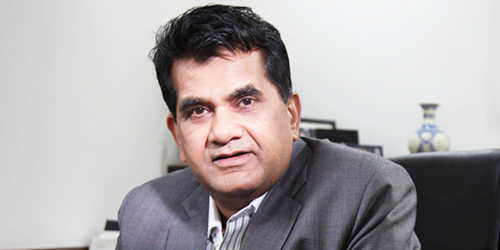The National Institution for Transforming India, also called Niti Aayog, is the Indian government’s premier policy think tank. Its current chairman is Prime Minister Narendra Modi. The institute published a draft discussion paper last week entitled “Blockchain: The India Strategy – Towards Enabling Ease of Business, Ease of Living and Ease of Governance.”
The 59-page policy paper is part one of two. It discusses the basics of blockchain technology, its framework, the implementation challenges and lessons from Niti Aayog’s experiences, its use cases, and recommendations for India’s blockchain strategy.
The policy think tank for the government of India, Niti Aayog, has published a strategy document identifying a number of key areas blockchain technology can significantly benefit the country. “By empowering citizens through features of transparency, decentralization and accountability, blockchain would help in improving ease of living”, explained Niti Aayog.
Niti Aayog’s Blockchain Strategy for India
Niti Aayog CEO Amitabh Kant commented:
Governance in India faces unique challenges given the scale, diversity and complexity of processes involved for delivery of varied public services. Blockchain offers unique possibilities of addressing issues relating to improving governance.
“By empowering citizens through features of transparency, decentralization and accountability, blockchain would help in improving ease of living”, he added.

Niti Aayog CEO Amitabh Kant
“This strategy document is targeted at all stakeholders such as government, enterprise leaders, and citizens, with the aim to demystify the concepts surrounding this technology, identify areas where it can be utilized for more transparent and open models of cooperation between entities and recommend the next steps towards achieving this goal”, the paper explains.
Key Use Cases for India
The report then outlines a number of areas blockchain technology can help India, such as “better contract management and procurement, greater accountability and quality control across supply chains and decentralization of authority in decision making.”
Niti Aayog specifically described several use cases for which it had been experimenting on using blockchain technology. The first was using a blockchain to create a new system to manage land records. The second was using it for the pharmaceutical drugs supply chain, the institute detailed, noting:
It was found that blockchain technology has the potential to improve transparency, efficiency and reliability of transactions in a heavily regulated pharmaceutical industry.
The third was using blockchain technology for educational certificates to fight fraud. Other use cases the institute mentioned include the immunization supply chain, chit funds, insurance such as medical and automotive, EV battery swapping, organic farming, and energy trading.
Decentralized, P2P Systems
Stressing the importance of understanding the mechanism of decentralization behind peer-to-peer (P2P) exchange, Niti Aayog asserted: “Networks completely regulated by governments can be decentralized and feature peer-to-peer exchange and, totally centralized systems can also be unregulated and operate beyond the bounds of law. Decentralized networks do not necessarily mean they aren’t regulated.” The report also discusses permissioned and permissionless systems. Niti Aayog recommends:
Governments should pay special attention to decentralised networks where peer-to-peer transactions can create more socio-economic value.
The strategy document additionally suggests that “Sectors of governmental intermediation where a state entity is involved just for ledger maintenance or collecting state dues but is not adding value to the transaction can be relooked to assess how government’s role can be redefined in those sectors.”
Integrating Blockchain Solutions
Niti Aayog believes that “India has a unique strategy for the government to take the lead in creating public digital infrastructure and allowing private sector innovation to leverage it for further development.” Some examples of digital infrastructure built by the Indian government are Aadhaar, UPI, e-sign, Digilocker, and digitally enabled tax governance or health coverage networks. The think tank detailed:
From an India use case perspective, blockchain solutions are both appropriately suited for addressing several challenges and will also benefit from the infrastructure created already.
At the end of the document, Niti Aayog highlighted a number of recommendations it will discuss in the second part of the strategy report, expected to be released in the coming weeks. It will cover specific recommendations that can enable the growth of India’s blockchain ecosystem, including regulatory and policy considerations and the creation of Indiachain, a national infrastructure for the deployment of blockchain solutions. Moreover, a strategy for India to become a blockchain hub for research and development and workforce training will be discussed, along with the procurement process for government agencies to adopt blockchain solutions and an Indian rupee-pegged stablecoin.
Niti Aayog’s paper followed a publication by the National Institute for Smart Government (NISG) on India’s National Strategy on Blockchain, which was tasked with preparing the policy by the National e-Governance Division, under the Ministry of Electronics and Information Technology (MeitY).


